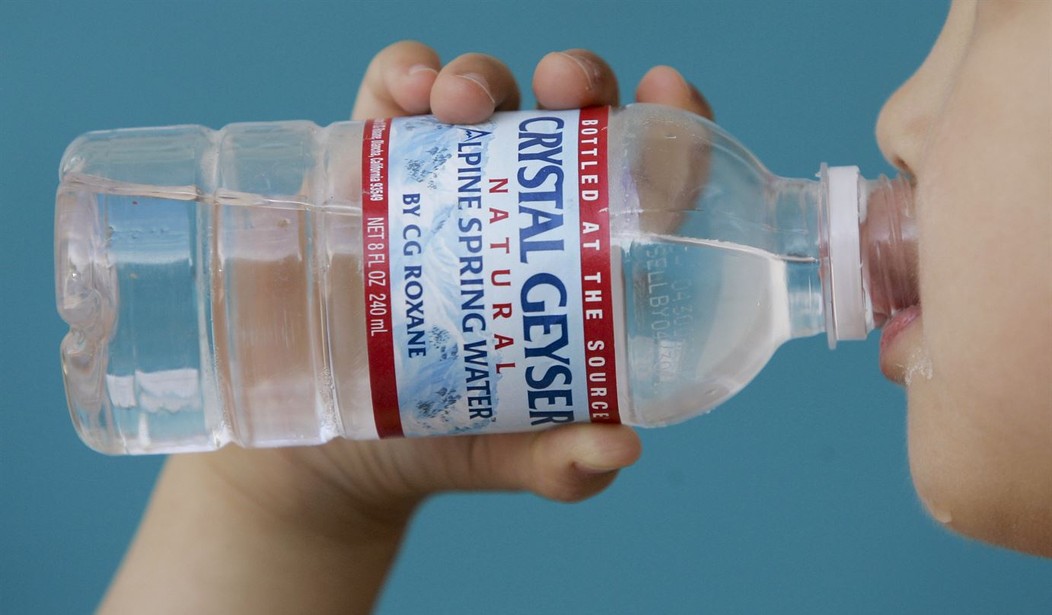If there were a competition to determine which nation could come up with the silliest things to address the public policy bugaboo of climate change, the once-Great Britain would have to be well up there on the list.
This time, it's about bottles. You know, those prosaic little things that we keep liquids in. Sometimes, they are made of glass, which is made from silica, one of the most common substances in the earth's crust. Glassmaking as an art and as a craft goes back thousands of years. Other bottles are made of plastic, usually High-density polyethylene (HDPE.) HDPE is a by-product of petroleum refining.
And that's why the British taxpayers are about to take a soaking. It's all about the carbon footprints, you see, and so the taxpayer cash is about to be "ploughed" into bottles made from wood.
Britain’s National Wealth Fund, which is fully owned by the Treasury, on Wednesday announced a £43.5m investment into Cambridgeshire-based start-up Pulpex, which makes recyclable water bottles out of wood pulp.
The investment will help finance Pulpex’s plan to build its first ever manufacturing plant, near Glasgow, which is expected to produce 50m wooden bottles each year and create 35 jobs in Scotland.
The wood-based bottles have a lower carbon footprint than plastic or glass and Ian Murray, the Scottish Secretary, said the investment would “aid the decarbonisation of our packaging industry and help accelerate our net zero goals as we drive delivery of clean power by 2030”.
My first reaction to this claim — that wood-based bottles have a lower carbon footprint than plastic or glass — is "Show your work." Let's see the numbers because, as always, you can color me skeptical. The claim is that these wooden bottles have a lower carbon footprint; OK, then, let's see the proponents of this silly idea quantify the carbon footprints of wooden, plastic, and glass bottles.
The British government, apparently, expects the people to just accept this claim uncritically. Fortunately, on this side of the pond, at least one American is a little more critical.
The Scottish National Investment Bank, which is fully owned by the Scottish government, is investing £10m alongside the National Wealth Fund and Pulpex ultimately hopes to raise £62m.
Rachel Reeves, the Chancellor, hailed the investment as “welcome news” that was “creating jobs, sustainable growth and opportunity in Scotland”.
The UK’s endorsement of wood-based bottles comes as Donald Trump rails against similar products in the US. Last week, the president signed an executive order to ban the US government from buying paper straws.
Mr Trump told reporters: “We’re going back to plastic straws.”
This is part of the United Kingdom's efforts at "Net Zero." That seems to be a synonym for "pouring taxpayer cash down yet another rathole."
See Related: Et Tu, Stacey? Stacey Abrams Linked to a $2 Billion Environmental Grant Rolled Up by DOGE
And what's crazy is that the Telegraph reports this so uncritically. Nowhere does this publication attempt to justify spending £43.5 million — that's about $55 million in American cash — for 35 jobs. And that's only the beginning; these things always seem to end up costing more than planned.
$55 million for 35 jobs — that's a bit over a million and a half per job. We must also come back to the inevitable economics statement: If this were a viable business model, it wouldn't require a government subsidy. Let this company make its case to private investors, to commercial banks, and if there's a market for wooden bottles, best of luck to them. If there's not, the taxpayers of the United Kingdom shouldn't be on the hook for this silliness.
Also, trees are carbon sinks. Whether one is worried about climate change or not, trees are still big carbon sinks. They take carbon from the atmosphere in the form of CO2 and convert it to sugars that are essentially food for the tree. How many trees will these wooden bottles cost?
There are other issues. Can these bottles be reused? Wood — cellulose — is porous. Can these bottles be cleaned for reuse? I know HDPE bottles can be reused, up to a point, and they can be effectively cleaned — ditto for glass bottles. Some of us remember back in the day when pop came in bottles of heavy glass, which you returned for the nickel deposit. They went back to the bottlers to be sterilized and refilled. Now that was a sustainable business model, which lasted until the lower-cost HDPE bottles took over that market.
This is another boondoggle in the name of climate change. It's a waste of the British taxpayer's cash to deal with a problem that isn't a problem and, in the process, make a carbon footprint claim that isn't supported. It is, as one famous British current-events and commentary program might have said, too silly.














